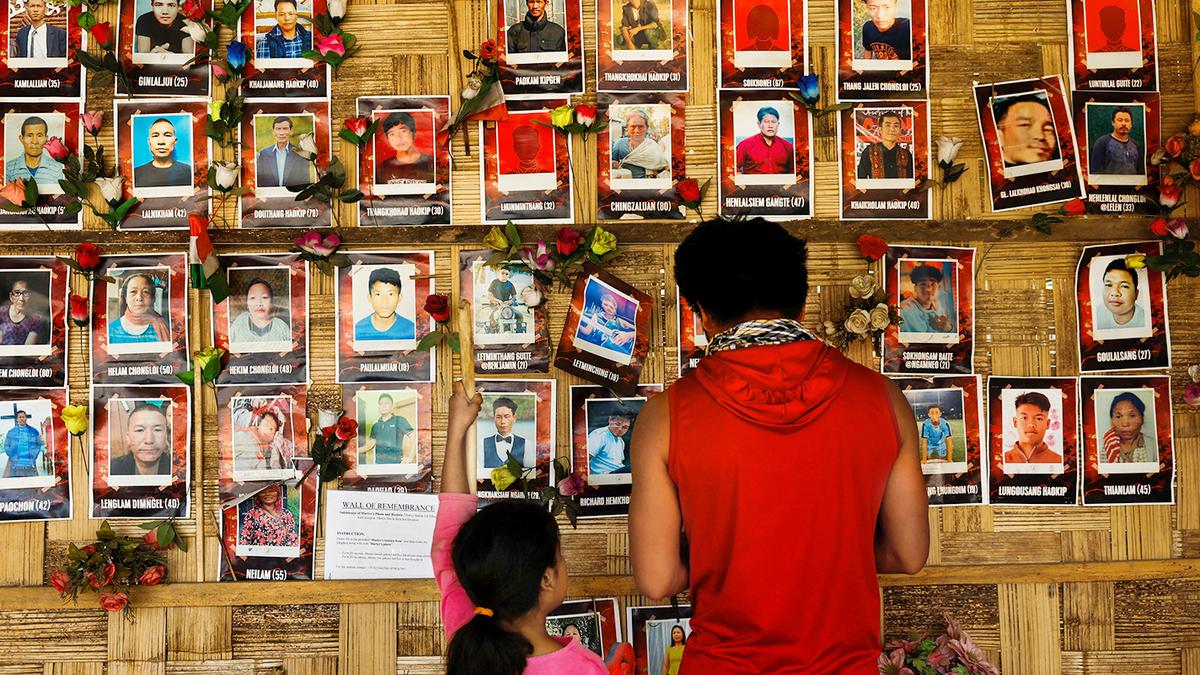
Kuki people look at photographs of those who died in ethnic violence at a ‘Wall of Remembrance’ memorial, in Churachandpur, Manipur.
| Photo Credit: Reuters
Shutdowns marked the second anniversary of the ethnic conflict in Manipur as the Kuki-Zo and Meitei communities remembered the victims of the violence in their respective areas of dominance on Saturday.
Educational institutions and businesses in the Meitei-majority Imphal Valley shut down in response to a call by the Coordinating Committee on Manipur Integrity (COCOMI), a conglomerate of social organisations, to attend a public convention at Khuman Lampak Stadium in Imphal.
People in the hills dominated by the Kuki-Zo group of tribes also observed a shutdown called by the Zomi Students Federation and the Kuki Students Organisation.
At the COCOMI event, people offered floral tributes in memory of the victims. The speakers, including scholars, eminent personalities, and leaders of civil society organisations, called for peace, justice, resolution of the conflict, and the protection of Manipur’s territorial integrity.
The tenor of the Imphal convention contrasted with ‘Separation Day’, the theme of the anniversary event organised by the Indigenous Tribal Leaders’ Forum, which has been batting for the rights of the Kuki-Zo people. The highlight of the forum’s programme was the convergence of hundreds of people at the ‘Wall of Remembrance’ in Churachandpur to pay their homage to the Kuki-Zo victims of the conflict.
Editorial | Ending the tragedy: On the Manipur crisis, a solution
The emphasis of the ‘Separation Day’ was on the Kuki-Zo demand for a separate administration that has been gaining momentum since the ethnic conflict broke out two years ago.
Security was heightened in different parts of the State, specifically in the Kuki-Zo and Meitei areas. However, no untoward incident was reported.
The ethnic violence erupted on May 3, 2023, after tribals in the hill districts took out a solidarity rally to protest the State government’s alleged move to grant Scheduled Tribe status to the Meiteis concentrated in the Imphal Valley, which along with the Jiribam area, comprise about 10% of Manipur’s geographical area.
The violence left more than 250 people dead and some 60,000 others displaced. Most of the displaced people continue to live in relief camps.

Such has been the impact of the conflict that the Meiteis and Kuki-Zos are ethnically partitioned, unable to venture into each other’s areas. The Centre tried to bridge the divide by opening up the highways — Manipur’s lifelines connecting the Imphal Valley to the country beyond through the Kuki-Zo inhabited hills — on March 8.
The attempt, a month after Nongthombam Biren Singh stepped down as Manipur’s Chief Minister on February 9, backfired and claimed a life in the process.
Manipur has been under President’s Rule, imposed on February 13 after the Bharatiya Janata Party failed to reach a consensus on Mr. Singh’s successor. A few days ago, 21 MLAs of the National Democratic Alliance (NDA) in the State wrote to Prime Minister Narendra Modi and Union Home Minister Amit Shah, demanding the immediate installation of a “popular government” in the State.
The Opposition Congress, meanwhile, demanded fresh elections as the “double-engine government” and the President’s Rule failed to bring back peace and normalcy in Manipur apart from ensuring free movement and the return of the displaced people to their homes.
Published – May 03, 2025 08:53 pm IST
Anurag Dhole is a seasoned journalist and content writer with a passion for delivering timely, accurate, and engaging stories. With over 8 years of experience in digital media, she covers a wide range of topics—from breaking news and politics to business insights and cultural trends. Jane's writing style blends clarity with depth, aiming to inform and inspire readers in a fast-paced media landscape. When she’s not chasing stories, she’s likely reading investigative features or exploring local cafés for her next writing spot.




